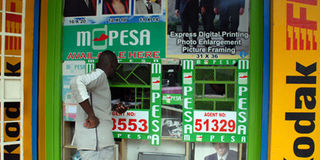Why these anomalies in e-money transfer practices ?

A customer is served at an M-Pesa shop along Banda Street, Nairobi on February 19, 2013. There have been calls to open up MPESA to more operators. PHOTO : Salaton Njau
What you need to know:
- If you are an M-Pesa customer and you receive Airtel money, you can only draw it from an Airtel agent and you must draw the entire amount in cash within seven days.
- Thousands of small retail investors at the grassroots must be freed from exclusive service contracts with telecom companies
- Safaricom has, in the past, claimed that M-Pesa is its proprietary product
Imagine you had a bank account with Barclays Bank and they insisted that all cheques drawn on other banks will not be credited to your account but instead, the entire amount must be drawn in cash within seven days, otherwise the money is returned to whoever wrote you the cheque in the first place.
Does that sound grotesque? Do you think the Regulator, the Central Bank of Kenya (CBK), would allow Barclays to conduct business in such a manner?
I don’t think so! But that’s exactly what CBK has allowed Safaricom to do with their M-Pesa platform. If you are an M-Pesa customer and you receive Airtel money, you can only draw it from an Airtel agent and you must draw the entire amount in cash within seven days, otherwise it is returned to the sender because it cannot be credited to your “e-wallet” (my term) account.
The M-Pesa business model effectively keeps Safaricom customers captive and unavailable to other money transfer service providers. The model is also ring-fenced by a discriminatory tariff, which makes it significantly more expensive for Safaricom subscribers to send money to customers on rival platforms. These restrictive business practices are illegal.
Safaricom has, in the past, claimed that M-Pesa is its proprietary product and that it should not be penalised for the massive success in the money transfer market.
This is a side-show aimed at blurring the real issue; customer experience in cross-network services. Safaricom customers routinely call (voice) and send SMS (data) to subscribers on other networks and the technical and logistical arrangements with rival platforms that make this possible are already in place.
The same is true in respect of money transfers with no adverse effects whatsoever on “proprietary assets”.
A money transfer transaction is essentially an SMS either within the same network or across networks. There is, therefore, no extraordinary challenge in providing the public with the facility of what we would call an “e-wallet account” in which all credits and debits from across all networks are made.
There have been newspaper reports that Safaricom has offered to negotiate a settlement with rival Airtel in an abuse of dominance dispute filed before the Competition Authority.
The Authority cancelled a “Hearing Conference” scheduled for October 29 because Safaricom offered to negotiate, but noted that “we have not been provided with the terms of the proposed settlement”.
Whatever these terms might eventually be, public interest must be served in two important respects. First, the thousands of small retail investors at the grassroots, who come into contact with customers, must be freed from exclusive service contracts with telecom companies, and be free to serve any and all of the money transfer companies within their kiosks and their small business premises.
They should be able to serve all brands without fear of reprisals or intimidation from the dominant M-Pesa. Such intimidation is currently rampant!
Second, the public must be able to send, receive, accumulate or effect money transactions from their own personal cross-network e-wallet.
Inasmuch as a bank account debits and credits client money drawn on whatever bank, so too must the public enjoy an e-wallet into which all credits and debits from whatever e-money transfer company are transacted. This is of paramount public interest.
Mr Ngugi is a consultant on public affairs and policy. ([email protected])




